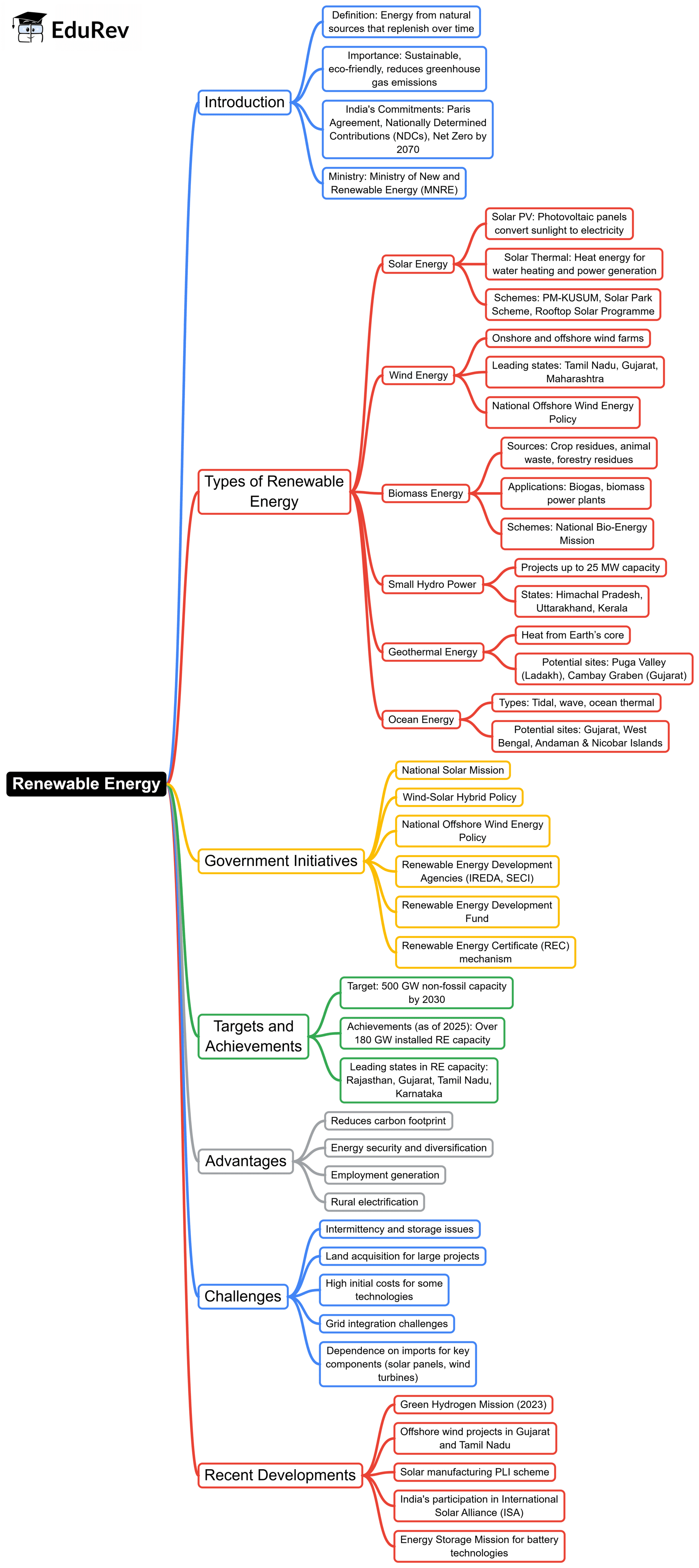UPSC Exam > UPSC Notes > Science & Technology for UPSC CSE > Mind Map: Renewable Energy
Mind Map: Renewable Energy | Science & Technology for UPSC CSE PDF Download

The document Mind Map: Renewable Energy | Science & Technology for UPSC CSE is a part of the UPSC Course Science & Technology for UPSC CSE.
All you need of UPSC at this link: UPSC
|
90 videos|490 docs|209 tests
|
FAQs on Mind Map: Renewable Energy - Science & Technology for UPSC CSE
| 1. What are the main types of renewable energy sources and their benefits? |  |
Ans. The main types of renewable energy sources include solar energy, wind energy, hydroelectric power, geothermal energy, and biomass. Each of these sources has distinct benefits:
- <b>Solar Energy</b>: Harnesses sunlight to produce electricity, reducing reliance on fossil fuels and lowering greenhouse gas emissions.
- <b>Wind Energy</b>: Utilizes wind turbines to generate power, which is clean and sustainable, and requires minimal water for operation.
- <b>Hydroelectric Power</b>: Generates electricity by harnessing the flow of water, providing a consistent power supply and enabling water management.
- <b>Geothermal Energy</b>: Extracts heat from the Earth’s core for heating and electricity, offering a stable and reliable energy source.
- <b>Biomass</b>: Converts organic materials into energy, helping in waste management and reducing carbon footprint when sourced sustainably.
| 2. How does renewable energy contribute to combating climate change? |  |
Ans. Renewable energy significantly contributes to combating climate change by reducing greenhouse gas emissions. Unlike fossil fuels, renewable sources produce little to no emissions during operation. Transitioning to renewable energy helps decrease the carbon footprint of energy production, mitigates air pollution, and promotes sustainable practices. This shift is crucial for meeting global climate targets and reducing the impacts of climate change.
| 3. What are the challenges associated with the adoption of renewable energy? |  |
Ans. The challenges associated with the adoption of renewable energy include:
- <b>Intermittency</b>: Many renewable sources, like solar and wind, are not always available, leading to reliability issues.
- <b>Storage</b>: Effective energy storage solutions are needed to store excess energy generated during peak production times for later use.
- <b>Infrastructure</b>: Upgrading existing energy infrastructure to accommodate renewable sources can be costly and time-consuming.
- <b>Initial Investment</b>: High upfront costs for renewable energy technologies can deter investment, despite long-term savings.
- <b>Policy and Regulation</b>: Inconsistent policies and regulations can hinder the growth of renewable energy markets.
| 4. What role do government policies play in promoting renewable energy? |  |
Ans. Government policies play a crucial role in promoting renewable energy by providing incentives such as tax credits, rebates, and subsidies to support the development and deployment of renewable technologies. Policies can also include mandates for renewable energy usage, research and development funding, and regulations that limit emissions from fossil fuels. By creating a favorable environment for investment and innovation, governments can accelerate the transition to a sustainable energy future.
| 5. How can individuals contribute to the growth of renewable energy? |  |
Ans. Individuals can contribute to the growth of renewable energy through various actions:
- <b>Adopting Renewable Technologies</b>: Installing solar panels or using wind turbines for personal energy needs.
- <b>Supporting Green Energy</b>: Choosing energy providers that supply renewable energy sources.
- <b>Conserving Energy</b>: Reducing overall energy consumption through energy-efficient appliances and practices.
- <b>Advocacy</b>: Supporting policies and initiatives that promote renewable energy at local, national, and international levels.
- <b>Educating Others</b>: Raising awareness about the benefits of renewable energy and encouraging community participation in sustainable practices.
Related Searches





















